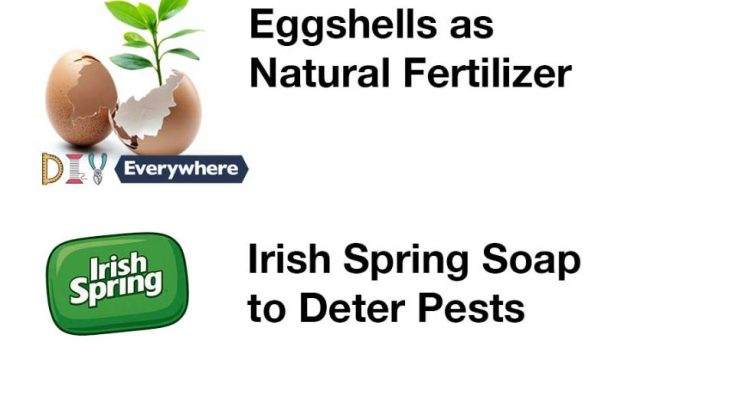Gardening can be both a rewarding and challenging endeavor. Whether you’re a seasoned gardener or a beginner, finding ways to make the process more efficient and effective is always beneficial. This article explores 18 of the best gardening hacks that have stood the test of time. These tips will help you improve soil quality, control pests naturally, and maximize your garden’s yield, all while saving time and money.
1. Eggshells as Natural Fertilizer
Eggshells are rich in calcium, which is essential for plant growth. By crushing eggshells and incorporating them into your soil, you can provide a slow-release source of calcium that helps strengthen plant cell walls. This is particularly beneficial for plants like tomatoes and peppers, which are prone to blossom end rot caused by calcium deficiency.
2. Coffee Grounds to Enrich Soil
Used coffee grounds are an excellent addition to your compost pile or directly to your garden soil. They are rich in nitrogen, which is a crucial nutrient for plant growth. Coffee grounds also improve soil structure and attract earthworms, which help aerate the soil and improve nutrient availability.
3. Vinegar as an Effective Weed Killer
Vinegar is a natural and effective weed killer due to its acetic acid content. Spraying vinegar directly onto weeds can help control their growth without the use of harsh chemicals. It’s best used on sunny days when the heat can enhance its effectiveness. However, be cautious as vinegar can also harm desirable plants if applied directly.
4. Regrowing Plants from Kitchen Scraps
Many vegetables can be regrown from kitchen scraps, making it a sustainable and cost-effective gardening hack. For example, green onions, lettuce, and celery can be regrown by placing their roots in water. This not only reduces waste but also provides a continuous supply of fresh produce.
5. The Benefits of Epsom Salt in Gardening
Epsom salt, which contains magnesium and sulfate, can be a valuable addition to your garden. Magnesium is essential for photosynthesis and helps plants absorb other nutrients. Dissolving Epsom salt in water and applying it to the soil can improve plant growth, especially for roses, tomatoes, and peppers.
6. Using Irish Spring Soap to Deter Pests
Irish Spring soap can be used to deter pests such as deer and rabbits from your garden. The strong scent of the soap is unpleasant to these animals. Simply cut the soap into pieces and scatter them around your garden or hang them from stakes to keep pests at bay.
7. Companion Planting for Natural Pest Control
Companion planting involves growing certain plants together to enhance growth and deter pests. For example, planting marigolds alongside tomatoes can repel nematodes, while basil can improve the flavor of tomatoes and deter flies. This method reduces the need for chemical pesticides and promotes a healthy garden ecosystem.
8. Creating a DIY Drip Irrigation System
A DIY drip irrigation system can save water and ensure that your plants receive consistent moisture. By using a network of hoses or tubing with small holes, you can deliver water directly to the plant roots. This method reduces evaporation and runoff, making it an efficient way to water your garden.
9. Mulching with Newspaper to Retain Moisture
Using newspaper as mulch is an effective way to retain soil moisture and suppress weeds. Lay down a few layers of newspaper around your plants and cover them with a layer of organic mulch, such as straw or wood chips. This not only conserves water but also adds organic matter to the soil as the newspaper decomposes.
10. Using Baking Soda for Sweeter Tomatoes
Baking soda can be used to reduce soil acidity, which can result in sweeter tomatoes. By sprinkling a small amount of baking soda around the base of tomato plants, you can help neutralize the soil’s pH, leading to a sweeter fruit. Be careful not to overapply, as too much can harm the plants.
11. Utilizing Banana Peels for Nutrient Boost
Banana peels are rich in potassium, phosphorus, and calcium, making them an excellent natural fertilizer. You can bury banana peels in the soil near your plants or soak them in water to create a nutrient-rich tea. This provides a slow-release source of essential nutrients that promote healthy plant growth.
12. Making a Homemade Compost Bin
Creating a homemade compost bin is a simple and effective way to recycle kitchen and garden waste into nutrient-rich compost. Use a large container or build a wooden structure to hold your compost materials. Regularly turn the pile to aerate it and speed up decomposition. This compost can then be used to enrich your garden soil.
13. The Power of Cinnamon as a Fungicide
Cinnamon has natural antifungal properties that make it an effective treatment for preventing and controlling fungal diseases in plants. Sprinkle cinnamon on the soil surface or on plant wounds to prevent fungal infections. It’s a safe and natural alternative to chemical fungicides.
14. Using Hydrogen Peroxide for Root Health
Hydrogen peroxide can be used to promote healthy root growth and prevent root rot. By diluting hydrogen peroxide with water and applying it to the soil, you can increase oxygen levels and kill harmful bacteria and fungi. This is particularly useful for potted plants and seedlings.
15. Natural Pest Control with Neem Oil
Neem oil is a natural pesticide derived from the seeds of the neem tree. It is effective against a wide range of pests, including aphids, spider mites, and whiteflies. By spraying neem oil on plants, you can control pest populations without harming beneficial insects. It’s a safe and eco-friendly option for pest management.
16. Creating a Vertical Garden for Small Spaces
Vertical gardening is an excellent solution for those with limited space. By using vertical structures like trellises, pallets, or wall-mounted planters, you can grow a variety of plants in a compact area. This method maximizes space and can enhance the aesthetic appeal of your garden.
17. Using Milk to Prevent Fungal Diseases
Milk can be used as a natural fungicide to prevent and treat fungal diseases like powdery mildew. By mixing milk with water and spraying it on affected plants, you can inhibit the growth of fungi. The proteins in milk act as an antiseptic, making it a safe and effective treatment.
18. The Benefits of Rotating Crops Annually
Crop rotation involves changing the location of plant families in your garden each year. This practice helps prevent soil nutrient depletion and reduces the buildup of pests and diseases. By rotating crops, you can maintain soil fertility and promote a healthy garden ecosystem.
Conclusion: Maximizing Your Garden’s Potential with Simple Hacks
By incorporating these simple gardening hacks into your routine, you can enhance your garden’s productivity and health. These tips offer natural and cost-effective solutions to common gardening challenges, allowing you to enjoy a thriving garden with less effort. Whether you’re looking to improve soil quality, control pests, or make the most of limited space, these hacks provide practical solutions for gardeners of all levels.



